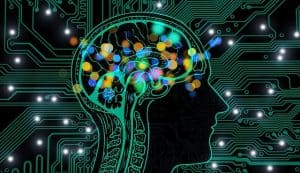
A Deloitte AI Institute global survey finds businesses are achieving competitive advantage from AI and expect to see increasing AI-powered transformation in the future.
AI is quickly evolving from science-fiction fantasy to real-world business necessity. Yet most companies are still struggling to harness its full potential. At the Deloitte AI Institute, we’ve identified the main barriers to effective AI adoption and are tackling those challenges head on.
According to our recent global survey of AI trends, “The State of AI in the Enterprise, 3rd Edition,” technology implementation and financial investment in AI continue to rise sharply. Survey respondents say they are achieving competitive advantage from AI and expect to see increasing AI-powered transformation in the future, both in their own organizations and throughout their industries.
See also: Deloitte Opens AI Institute
Of course, increased use of AI is a double-edged sword. On one side, it means more organizations will be able to benefit from AI. But on the other side, it levels the playing field and reduces early-mover advantage. Overall, this means every organization will need to improve its AI capabilities; however, those hoping to achieve competitive advantage through AI will need to work even harder.
Business-specific use cases
One of the biggest barriers to AI adoption is the lack of business-specific use cases and solutions. At the moment, AI still mostly offers general capabilities that can be very useful for any type of organization. However, until those general capabilities can be applied in ways that are specific to a particular type of business, their real-world value is limited.
In recent years, more and more companies have been experimenting with AI, advancing their data-related capabilities, acquiring new technologies and talent, and integrating AI into their business processes. Yet, in an era of pervasive AI – with advanced AI capabilities readily available to anyone – businesses will need to actively push the boundaries of what they can do with AI.
According to our survey, two-thirds of AI implementations are still primarily focused on automating and optimizing tasks that would normally be done by a human, rather than developing new game-changing AI capabilities that go beyond what humans can do on their own. Although automation and optimization are certainly worth pursuing for their cost and efficiency benefits, true competitive differentiation requires more than that.
At the AI Institute, we are collaborating with AI thought leaders and industry experts to develop business-specific AI use cases and solutions that can enhance people’s ability to accomplish tasks, enabling them to do things they could not do without AI. This can lead to new insights, new products and services, and even new business models.
Trustworthy AI
Despite the growing importance of AI in business, our study found most respondents only feel somewhat prepared to manage AI risks – and too few organizations are implementing specific practices to address those risks.
As AI expands into almost every aspect of modern life, its associated risks increase exponentially. Unfortunately, more than half of respondents report “major” or “extreme” concerns about potential risks for their AI initiatives, and only four in 10 rate their organization as “fully prepared” to address them. What’s more, 56% say their organization is slowing adoption of AI technologies because of the emerging risks, and the same proportion believe that negative public perceptions will slow or stop adoption of some AI technologies.
Deloitte’s Trustworthy AI Framework is designed to help organizations evaluate the ethical health of their AI applications while maintaining customer privacy and abiding by relevant policies and regulations.
The framework highlights six key requirements to address when designing, developing, deploying, and operating AI systems:
- Fair and impartial use checks: AI applications include internal and external checks to help ensure equitable application across all participants.
- Transparent and explainable AI: All participants are able to understand how their data is being used – and how the AI systems make decisions. Algorithms, attributes, and correlations are open to inspection.
- Responsibility and accountability: Policies are in place to determine who is held responsible for the output of AI system decisions.
- Robust security: AI systems are protected from threats (including cyber) that may cause physical and/or digital harm.
- Reliability monitoring: AI systems that learn from humans and other systems are constantly monitored to ensure they produce consistent and reliable outputs.
- Privacy safeguards: Consumer privacy is respected, and customer data is not used beyond its intended and stated use. Consumers are able to opt-in or opt-out of sharing their data.
Addressing these issues to help achieve AI that can be trusted is essential to widespread AI adoption – and a key focus area for the AI Institute.
AI innovation through collaboration
AI research and technologies are advancing so quickly that it’s impossible for any single organization to be fully up to speed on everything – or to drive comprehensive AI innovation all on its own. At the AI institute, we are bringing together the best thinking and insights from every layer of the AI ecosystem – from startups, venture capitalists, and academia to industry experts, research firms, thinktanks, mature AI product companies, and everything in between. We are then combining those ideas with Deloitte’s deep business, technology, and applied AI expertise to start conversations and accelerate the pace of innovation.
One of our top priorities is getting AI innovations into the enterprise quickly so that businesses can start enjoying the benefits as soon as possible. This requires actively working to catalyze, develop, and sustain new AI startups and technologies with disruptive potential. However, it also requires deep knowledge of business and applied AI to ensure the innovations are practical and useful.
In collaboration with its ecosystem partners, Deloitte will match promising AI startups with applicable Deloitte practices in areas such as auto machine learning, visual AI, conversational AI, and secure AI. It will also partner with startups on thought leadership and research and provide business expertise that helps them reach new audiences and further develop their offerings.
By connecting the dots, the Deloitte AI Institute is helping to foster AI innovation that works in the real world.
COVID-19 acceleration
Due to the unprecedented nature of the COVID-19 pandemic, many organizations around the world have had to quickly respond and take decisive action to maintain business continuity or address new and unexpected challenges.
For many industries, this is accelerating the pace of AI deployment. For example, in life sciences, AI is being used to review enormous amounts of health data to unlock clues and trends around COVID-19. In manufacturing, companies are turning to automation and robotics to maintain operational processes and fill workforce gaps.
Robotics companies are seeing demand skyrocket as restaurants and other delivery-based services change their models to minimize human contact. And as thinking shifts from crisis response to recovery, there will be a greater need for scenario planning for a world reshaped by COVID-19.
AI will be at the forefront of driving data-driven scenario planning, capitalizing on its ability to deal with the large volumes and varieties of data necessary to match the velocity of a rapidly changing landscape. The AI Institute is helping organizations get in front of the challenge by developing new, accelerated approaches to AI planning and deployment.
AI that works
AI is quickly becoming a business imperative for companies in every industry, transforming the competitive landscape. Yet there are still significant barriers to successful AI development and adoption. Deloitte’s AI Institute is connecting the dots across the AI ecosystem to address those barriers and accelerate the pace of innovation and adoption, redefining what’s possible and helping put the transformative power of AI to work in the enterprise.
About the AI institute
The Deloitte AI Institute is helping organizations transform with AI through cutting-edge research and innovation. In collaboration with the brightest minds in AI – including industry thought leaders, academic luminaries, start-ups, research and development groups, entrepreneurs, investors, and innovators – we are challenging the status quo and advancing the development of AI and human-machine collaboration.
Our current priorities include: developing business-specific use cases that can help organizations achieve competitive differentiation in a world where AI is pervasive; addressing critical challenges related to AI ethics and trustworthiness; expanding the boundaries of AI innovation; and getting in front of the boost in AI interest and adoption being driven by the COVID-19 pandemic.




























